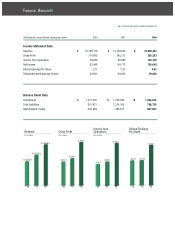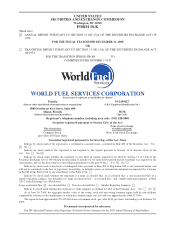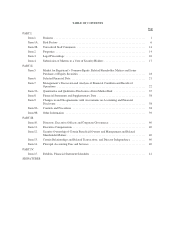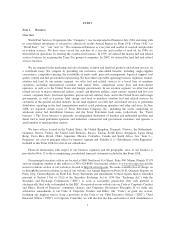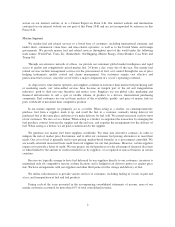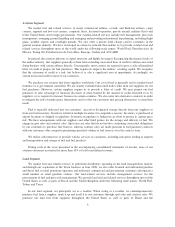World Fuel Services 2008 Annual Report Download - page 15
Download and view the complete annual report
Please find page 15 of the 2008 World Fuel Services annual report below. You can navigate through the pages in the report by either clicking on the pages listed below, or by using the keyword search tool below to find specific information within the annual report.structures on future purchases of fuel, as well as derivative products designed to assist our customers in hedging
their exposure to fluctuations in fuel prices. For example, in the ordinary course of our business we enter into
fixed forward pricing contracts with our customers and suppliers under which we agree to sell or purchase, as the
case may be, fuel at fixed prices and they agree to purchase or sell, as the case may be, fixed volumes of fuel
during the term of the contract. If there is a significant fluctuation in the price of fuel there is a risk they could
decide to, or be forced to, default under their obligations to us. Even if the counterparty to a fixed forward pricing
contract does not default, if a customer has agreed to purchase fuel from us at a fixed price and the price of fuel
drops, we will be functionally extending unsecured credit to that customer at the time the fuel is purchased. We
have credit standards and perform credit evaluations of our customers and suppliers, which are based in part on
our credit history with the applicable party. In this difficult economic environment, our credit evaluations may be
inaccurate and we cannot assure you that credit performance will not be materially worse than anticipated, and,
as a result, materially and adversely affect our business, financial position and results of operations.
We also use derivatives to hedge certain of our fuel inventories and certain purchase and sale commitments.
In connection with these activities, we are exposed to financial risk associated with fluctuations in fuel prices.
We typically hedge this risk by entering into commodity-based derivative instruments with financial institution
counterparties, such as broker/dealers, commercial banks and investment banks. These transactions are typically
done on an unsecured basis and should the counterparty fail to honor its obligations under our agreements with
them, we could sustain significant losses which could have a material adverse effect on our business, financial
condition and results of operations.
We are exposed to various risks in connection with our use of derivatives.
We enter into financial derivative transactions to hedge our fuel inventories and certain purchase and sale
commitments. The majority of our derivatives are not designated as cash flow hedges for accounting purposes
and therefore changes in the fair market value of such derivatives are recognized as a component of revenue or
cost of revenue (based on the underlying transaction type) in our consolidated income statement. Our efforts to
hedge our exposure to fuel price fluctuations could be ineffective. For example, there currently is no market for
aviation jet fuel futures so we enter into hedging transactions with respect to our aviation business by trading in
heating oil futures. To the extent the price of aviation jet fuel and heating oil are not correlated, then our attempts
to mitigate price risk associated with our aviation business would not be effective. For purposes of hedging,
heating oil is not a perfect substitute for aviation jet fuel and it is not unseen for short-term significant differences
in the pricing to occur. For example, in the period immediately following Hurricane Katrina in 2005, the price of
aviation jet fuel increased substantially while the price of heating oil remained relatively constant. Our hedging
activity is in the Level II and Level III categories within the fair value hierarchy set out in Statement of Financial
Accounting Standard (“FAS”) No. 157, “Fair Value Measurements,” and as such requires a high degree of
subjective assessment and judgment by management in connection with determining fair value. The risks we face
because of our use of financial derivatives have been exacerbated by the recent volatility in the financial and
other markets. In addition, we may fail to adequately hedge our risks if our employees fail to comply with our
policies and procedures on hedging, for example by failing to hedge a specific financial risk, which could subject
us to significant financial losses which could have a material adverse effect on our business, financial condition
and results of operations.
Changes in the market price of fuel may have a material adverse effect on our business.
Fuel prices which have been extremely volatile in the recent past, are likely to continue to be volatile in the
future, and depend on factors outside the control of the Company, such as:
• expected and actual supply and demand for fuel;
• political conditions
• changes in pricing or production controls by OPEC;
• technological advances affecting energy consumption and supply;
7


